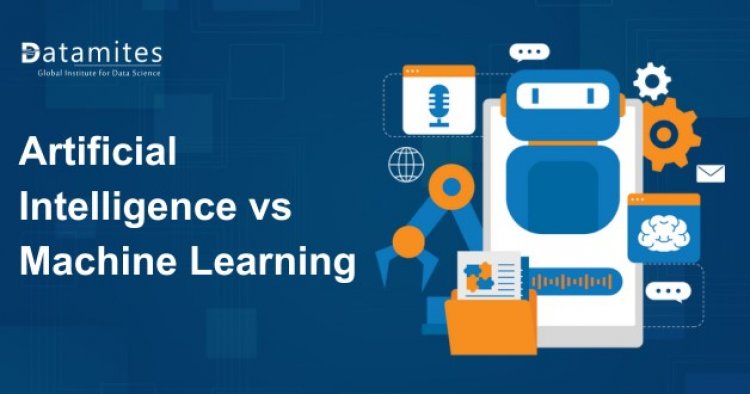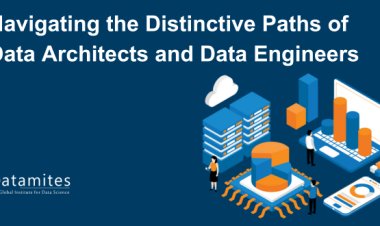Artificial Intelligence vs Machine Learning
Artificial Intelligence (AI) refers to the broader concept of machines performing tasks that typically require human intelligence. Machine Learning (ML), a subset of AI, focuses on algorithms that enable systems to learn from data and improve over time.

Within the broader field of computer science, artificial intelligence (AI) and machine learning (ML) are two closely related but separate fields. The goal of the field of artificial intelligence (AI) is to build robots that are intelligent enough to carry out tasks that traditionally require human intellect, such as speech recognition, visual perception, decision-making, and natural language processing. It entails the creation of algorithms and computer systems that can think logically, pick up new skills, and decide based on supplied data.
Machine Learning (ML), on the other hand, is an area of AI that focuses on teaching computers to learn from data without being explicitly programmed. In order to anticipate the future and make judgments, machine learning algorithms can spot patterns and trends in data.
In this article, we will discover the meaning of artificial intelligence as well as machine learning and the differences between them.
Refer these articles:
- Advantages and Disadvantages of Artificial Intelligence
- Complete Guide to Recurrent Neural Network
- Support Vector Machine Algorithm (SVM)
What Is Artificial Intelligence?
Artificial intelligence (AI) is computer software that imitates cognitive functions of humans in order to carry out complicated activities that were previously only able to be completed by humans, such as language translation, data analysis, and decision-making.
AI is, in other words, computer system programming that is intended to perform tasks that need human cognition. AI-powered machines and systems can learn from their interactions to enhance their performance and efficiency, in contrast to automated ones that only obey a set of instructions and do them without modification.
What Is Machine Learning?
A subfield of artificial intelligence called machine learning is concerned with creating machine learning models that are capable of performing challenging tasks like classifying images, forecasting sales, or analyzing vast volumes of data. Currently, the majority of people interact with AI mostly through machine learning.
Artificial Intelligence vs Machine Learning: Similarities
There are similarities between AI and ML, and they are connected. Since ML is a subset of AI, it can be thought of as an advanced method of implementing AI. ML is sometimes said to be the most advanced form of AI right now.
- Continuous evolving- Both artificial intelligence and machine learning are on a trajectory to become some of the most revolutionary and disruptive technologies to date. According to some analysts, advancements in AI and ML will have a greater influence on human life than either fire or electricity. The market will expand and more investments in AI will be made as more businesses and customers recognise the potential of solutions and products powered by AI.
- Offering numerous advantages- The wide range of advantages AI and ML provide to businesses and people is another noteworthy characteristic they both share. AI and ML technologies assist businesses in achieving operational excellence, enhancing worker productivity, overcoming labor shortages, and completing previously unachievable tasks. Businesses of all sizes and sorts are already affected by AI and ML, and public expectations in general are high. The economy is predicted to benefit from spending money on and implementing AI and ML, which will also intensify competitiveness, increase the number of tech-savvy workers, and encourage creativity in future generations.
- Using big data- AI and ML would not be where they are today without data. Large datasets and repeated processing methods are essential for the successful operation of AI systems. Only when given different kinds of structured and semi-structured data, do ML models function. At the heart of both ML and AI more broadly is the use of Big Data. As data is the lifeblood of AI and ML, maintaining its quality is a major concern for many businesses. For instance, if an ML model is fed inaccurate data, the results will reflect that.
Refer these articles:
- How to Become an Artificial Intelligence Engineer in India
- Top IT Companies in India
- Machine Learning Certification fees in India
Artificial Intelligence vs Machine Learning: Differences
Even with the above-mentioned similarities, AI and ML differ in ways that imply they shouldn’t be utilized interchangeably. One approach to distinguish between the two is to keep in mind that while all forms of ML are considered AI, not all forms of AI are ML.
- Scope- A machine with some degree of human intelligence is referred to as having artificial intelligence, which is a broad word for this concept. While machine learning is a more focused idea with a more narrow scope, it is seen as a broad term and is occasionally loosely defined. artificial intelligence specialists create intelligent systems that are capable of carrying out a variety of difficult jobs much like a human. On the other hand, machine learning researchers will put in time training computers to carry out a certain task and produce accurate results. It is reasonable to assume that experts employing artificial intelligence or machine learning may use various aspects of data and computer science for their projects because of this key distinction.
- Success vs Accuracy- Another distinction between artificial intelligence and machine learning approaches is that although machine learning strives to improve accuracy and find patterns, artificial intelligence aims to increase the likelihood of success. Success is less important in machine learning applications than it is in artificial intelligence ones. It’s also known that artificial intelligence seeks for the best answer for its users. More frequently, whether the answer is optimal or not, machine learning is applied. The “accuracy paradox” is a term used in machine learning, where machine learning models may produce high accuracy values but may mislead practitioners if the dataset is very unbalanced.
- Unique outcomes- Compared to machine learning, artificial intelligence is a much bigger notion that can be used in applications to assist users get the results they want. To complete its duties, artificial intelligence also uses logic, mathematics, and reasoning techniques, whereas machine learning can only learn from new data in order to adapt or self-correct. In some ways, machine learning capabilities are more limited than artificial intelligence. Machine learning models can only lead to a preset result, but artificial intelligence is more concerned with building an intelligent system that can achieve several goals.
Conclusion
Both machine learning and artificial intelligence are frequently applied in a variety of situations. Many real-world applications exist for both technologies. In conclusion, ML addresses issues after forming predictions and learning from data, whereas AI manages issues that call for human intelligence.
The best course for tackling cutting-edge concepts in computer vision, natural language processing, GAN, and other significant AI topics is named Artificial Intelligence Expert (AIE) in Datamites. Artificial Intelligence Engineer is an advanced-level course. The candidates must be proficient in Python programming and possess a thorough understanding of machine learning.
DataMites Institute, a leading data science training provider, offers expert-led courses with IABAC certification. Elevate your skills in data science, artificial intelligence, and business analytics through comprehensive programs designed to meet industry demands. Gain hands-on experience, learn from industry professionals, and enhance your career prospects with globally recognized certifications from IABAC. Join DataMites Institute to unlock a world of opportunities in the dynamic field of data science.
DataMites offers a globally recognized Artificial Intelligence course, providing industry-accredited certification. On par with prestigious institutions like IIT and IIM, DataMites delivers top-quality AI training. The program covers advanced AI concepts, hands-on projects, and expert guidance. With a solid reputation, DataMites prepares professionals with the skills needed to thrive in AI-driven industries.





